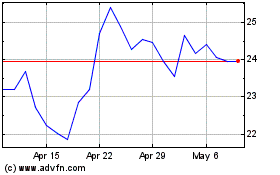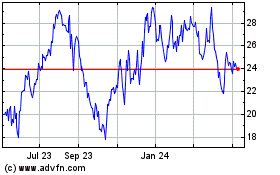Retailers Want More From Their Buck In 2010
January 10 2010 - 4:19PM
Dow Jones News
With budget cutbacks expected to continue in 2010, retailers say
they are especially intent on using the money they do spend to
deliver concrete returns.
Strategies include tracking potential customers as they surf the
Internet to create customized messages for them on retailers' own
online sites. Other retailers are installing solar panels and
putting demands on their business partners to be as energy
efficient as possible.
The goal is to receive and use returns on capital outlays to
help strengthen overall operations, as retailers continue dealing
with an economy and consumer confidence that remain tepid.
"We're looking at how we can be more targeted in how we talk to
our customers," said Barbara Hagen, senior marketing director for
brand strategy and communications at Best Buy Inc. (BBY). "It's a
way of increasing loyalty and retention."
Hagen was speaking at the National Retail Federation's annual
convention in New York City on Sunday.
The consumer electronics giant has begun tracking where
customers go after visiting its Web site in an effort to have a
more tailored message waiting for them once they return.
Hagen cited as an example someone looking at LED televisions on
Best Buy's site and then heading to a sports site to look at game
scores and then going to a sports magazine site.
Next time they visit Best Buy's site, there may be a message
tailored to the sports buff in them.
"We want to create communication that has more relevance to
individual customers," Hagen said.
Kohl's Corp. (KSS) is saving "tens of millions of dollars"
through measures that include using solar panels at about 80 of its
stores and demanding from its transportation suppliers and even
vendors that they be more energy efficient, said Ken Bonning,
executive vice president of logistics at the department store.
Efforts range from using power sources like wind turbines to
making energy efficiency a prerequisite of working with Kohl's,
Bonning said.
The goal is to get goods to stores with as little cost and
impact to the environment, with the money saved through these
efforts helping store operations.
While transportation companies can have their own incentives for
being energy efficient, making merchandise suppliers more
accountable can be a bit dicey, since many are still struggling
with the soft economy and not looking for added costs.
Bonning said the momentum for sustainability is building and
that it will become a "differentiating factor" for retailers as
well as their suppliers.
The comments came after Deloitte Touche Tohmatsu on Sunday
released results of a survey that said the net profit margin for
the world's 250 largest retailers fell to 2.4% in fiscal 2008 from
3.7% the prior year.
Sales rose by 5.5% for the group, to around $3.8 trillion, with
a lot of this business 'bought' by retailers through heavy
promotions that scalded bottom lines, said Ira Kalish, director of
consumer business for Deloitte Research in the U.S.
This year, Kalish said, retailers will be challenged to get the
right amount of inventory on their shelves to avoid large discounts
but be sufficient to meet the needs of improving demand in
2010.
-Karen Talley, Dow Jones Newswires; 212-416-2196;
karen.talley@dowjones.com
Kohls (NYSE:KSS)
Historical Stock Chart
From May 2024 to Jun 2024

Kohls (NYSE:KSS)
Historical Stock Chart
From Jun 2023 to Jun 2024
